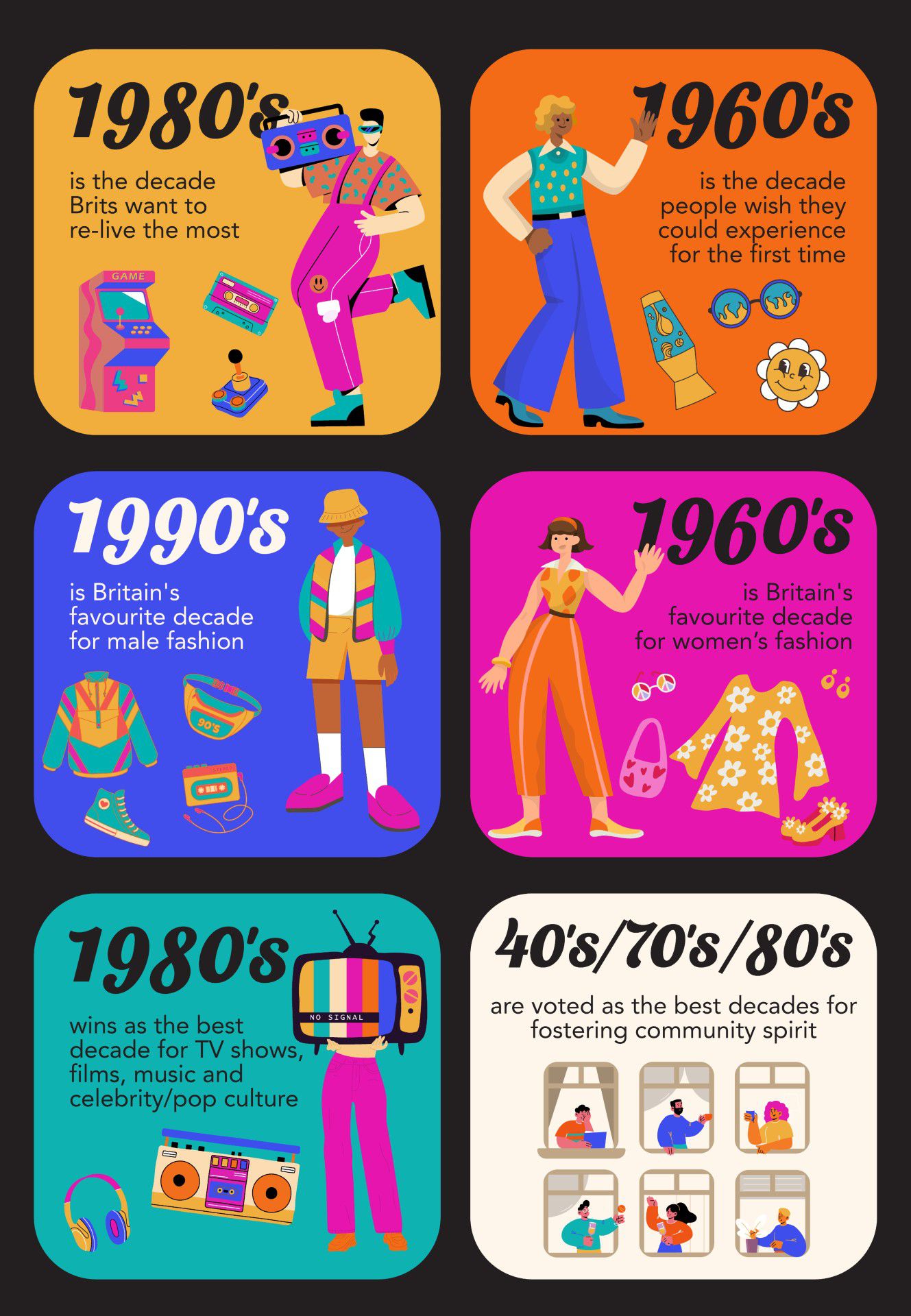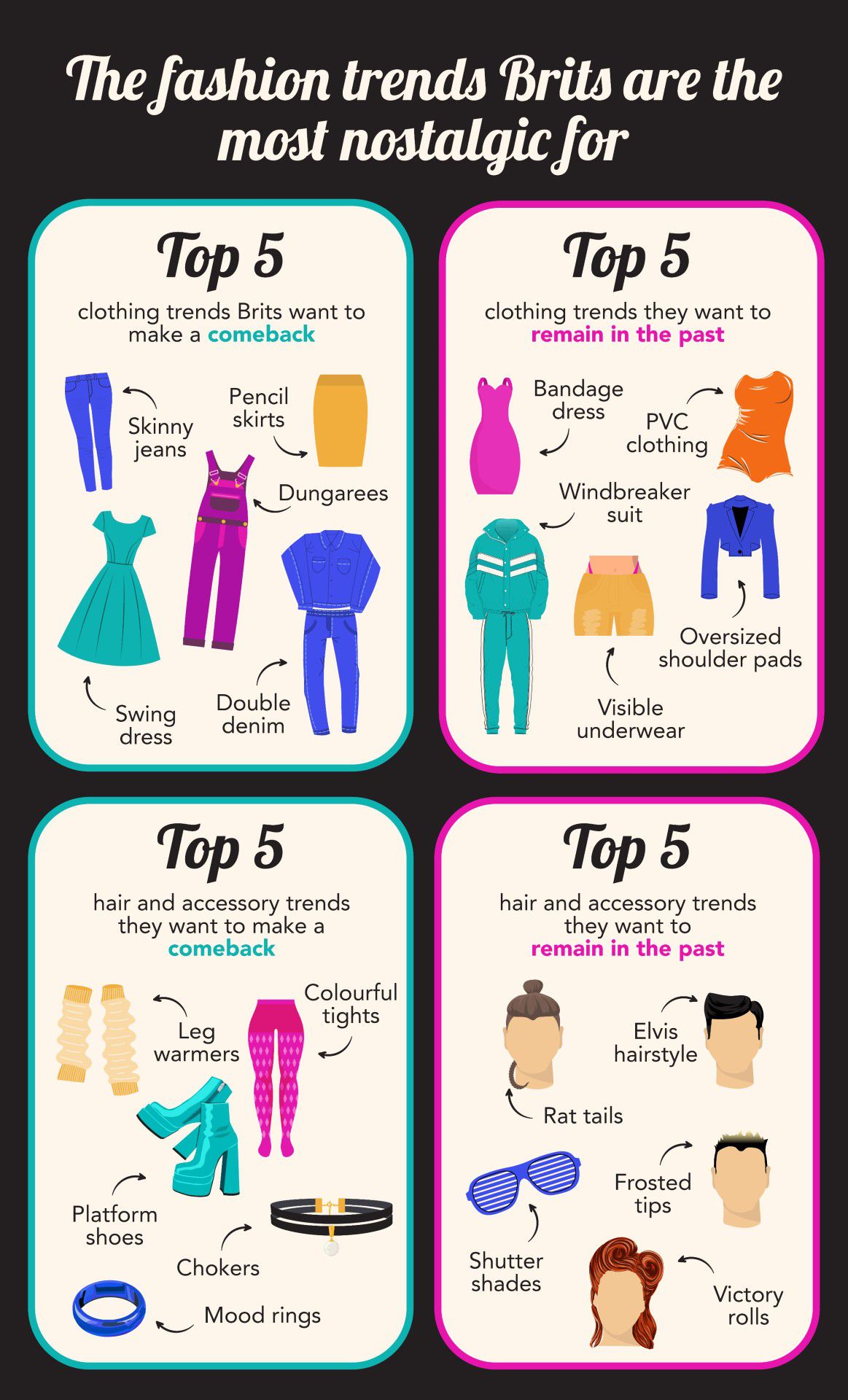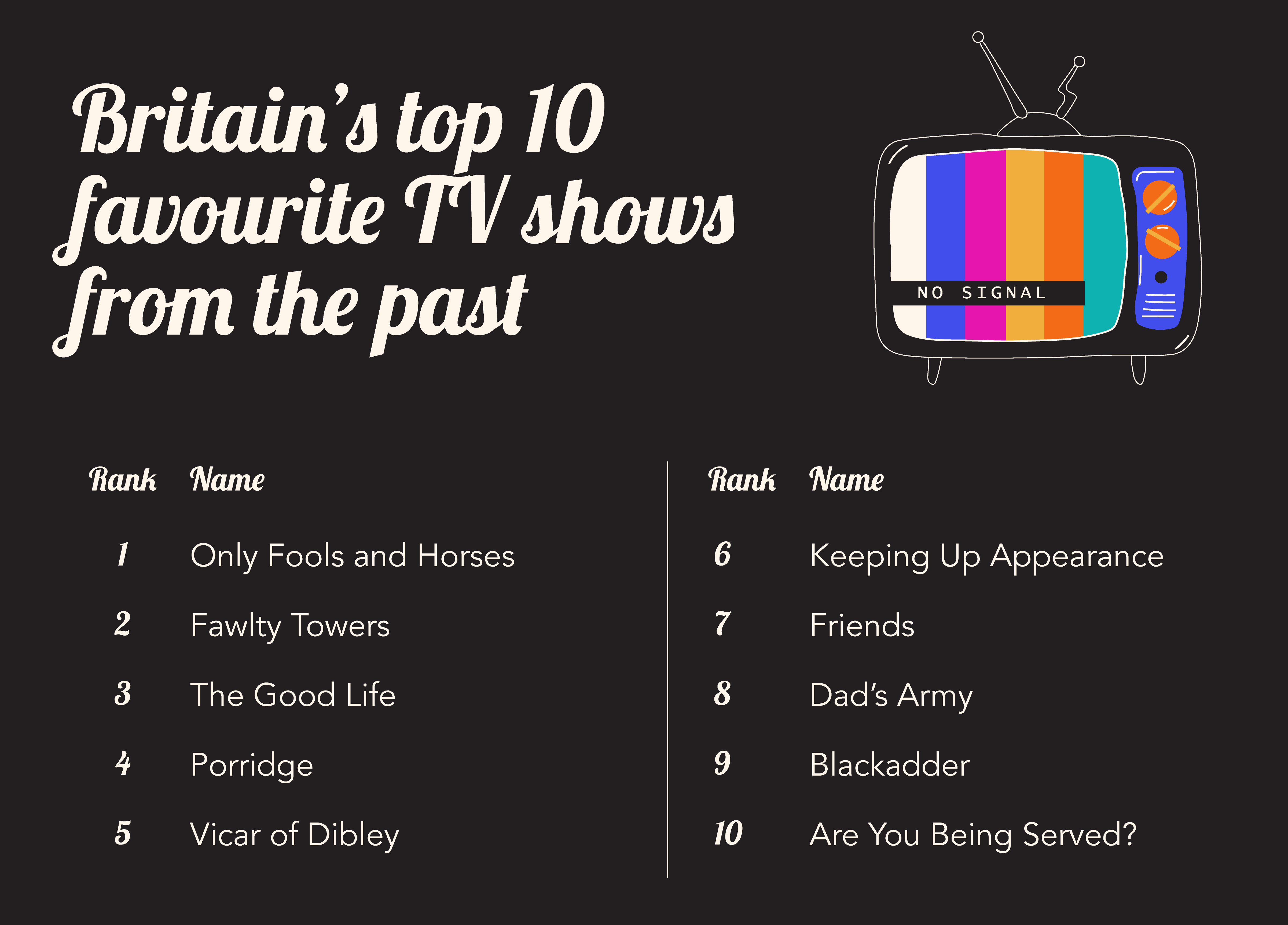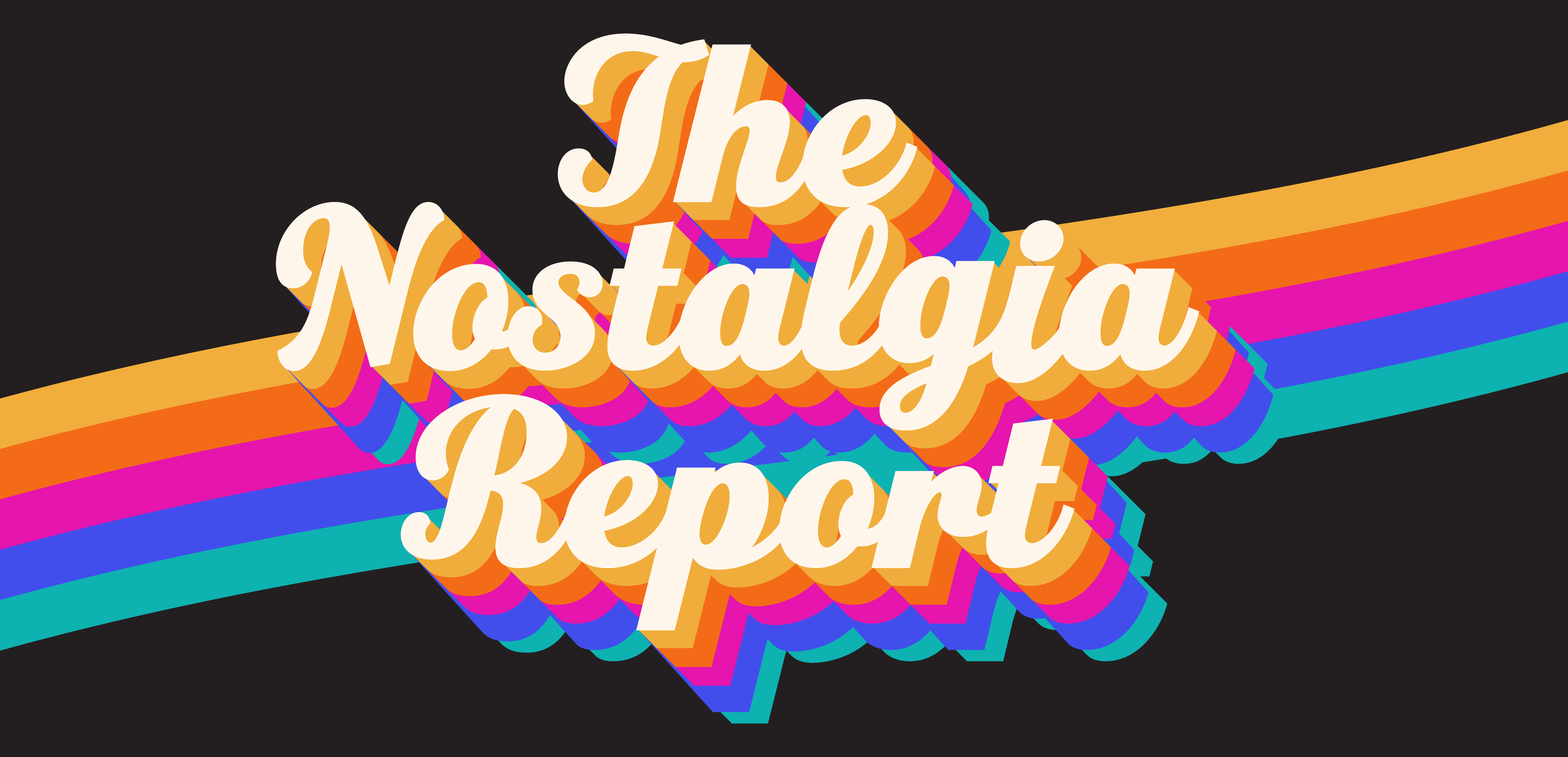Our new survey dives into Brits’ feelings of nostalgia, including the decade they want to relive.
Have you ever dreamed of hopping into a time machine and reliving your favourite decade? Whether it’s the vibrant energy of the 80s, the grunge and tech boom of the 90s, or the free-spirited vibes of the 60s, certain eras hold a special place in our hearts.
Betway’s new survey has delved deep into Britain’s nostalgia, revealing insights into our perceptions of different decades, our most-loved TV shows of the past, as well as the fashion trends and snacks we want to see make a resurgence.
With almost two thirds (65%) stating that they miss listening to CDs and mix tapes, and over half (56%) missing things like writing postcards and waiting for a new episode of their TV show to come out weekly, it’s clear that Brits are feeling a sense of nostalgia for the simpler ways of the past. In fact, over half (56%) agree that technology is making life more complicated than before. So, without further ado, what do Brits miss about the past, and what elements do they wish to bring back?
Most Brits wish they could live through the 1980s again, but they also long to have first-hand experience of the 1960s

The 1980s reign supreme as the decade most Brits want to live through again, with almost a quarter (22%) stating that they wish they could experience this iconic period once more. The 1990s come in second place as the decade Brits want to experience again (19%), followed by the 1960s and 70s (13%).
On the other hand, the 1960s emerged as the top choice for a first-time experience, with one in five (20%) stating they wish they could have lived through the care-free Swinging Sixties. However, for 25-34 year olds, the 1980s is the top decade that they want to experience first-hand, chosen by almost one in five (19%) of this demographic.
Brits think the 2020s have produced the best food, interior design and beauty trends, but they favour previous decades for fashion and entertainment
When it comes to the best decades for different areas of culture, from fashion to interior design, which decades do we favour for.
The results confirm that Brits think previous decades were better for all things fashion and entertainment, however interestingly, they consider the current decade (2020s) to be the best for food, interior design and beauty trends. However, as with many trends from the past, we may one day look back on these cultural elements from the present day and cringe at the thought of them…
The most popular decade for elements of popular culture, from fashion to food:
|
Culture element |
The best decade for each |
|
Male fashion |
1990s |
|
Female fashion |
1960s |
|
TV shows |
1980s |
|
Music |
1980s |
|
Films |
1980s |
|
Food |
2020s |
|
Interior design |
2020s |
|
Celebrities / pop culture |
1980s |
|
Beauty trends |
2020s |
|
Community spirit |
1940s or earlier, 1970s & 1980s |
The 1980s dominates as the favourite for all things media, including TV shows, films, music and pop culture. With this decade seeing the rise of the likes of Madonna and Bowie, as well as the release of iconic blockbuster films such as E.T., Ghostbusters and Top Gun, it’s hardly surprising that this decade is remembered so fondly.
Further to this, due to the rise of satellite television and the launch of household-name shows such as Only Fools and Horses, Black Adder and Dynasty, the Eighties took at-home entertainment to new heights, providing Brits with a lot to feel nostalgic for.
Meanwhile, the 1990s takes the crown for men’s style, with baggy jeans, flannel shirts, and iconic sportswear dominating the scene. For women, however, the 1960s stand out as the favourite, known for its range of styles from the timeless mod look to the rising hippie style which also dominated the 1970s.
Skinny jeans are the top fashion trend Brits want to make a comeback, whereas the majority agree that PVC clothing can stay in the past

Whilst skinny jeans have been trying to make a comeback recently, many are still hesitant to squeeze into their tight fit, preferring looser and more flattering cuts. Despite this, almost a quarter (23%) say that they want to see skinny jeans make a full return, jumping to 34% amongst 25-44 year olds. This is followed by pencil skirts (23%), which most recently made a comeback in the 1980s with the rise of ‘power dressing’, and dungarees (21%), which are also known for being popularised in the 1980s.
Looking at differences in perception between men and women, men are most eager to see skinny jeans and double denim make a comeback, wanting to leave peplum tops fully in the past. Meanwhile, for women, pencil skirts, dungarees, swing dresses and skinny jeans are the top choices, whereas uncomfortable PVC clothing is the bottom choice.
Looking at hair and accessory trends specifically, leg warmers (17%), colourful tights and platform shoes (16%), followed by chokers and mood rings (15%) come out on top as the trends from the past people want to see make a comeback. Being a mix of trends from the 60s, 70s, 80s and 90s, it’s clear that previous decades have provided us with iconic looks we wish we could wear again.
On the other hand, PVC clothing, bandage dresses and windbreaker suits are the clothing trends we’d rather stay in the past. Rat tails, the Elvis hairstyle, also known as the Pompadour hairstyle, frosted tips, shutter shades and Victory Rolls (made famous in the 1940’s) are the hair and accessory trends Brits don’t want to see recreated in the 2020s.
Only Fools and Horses is Britain’s favourite TV show from the past, with the majority agreeing it has stood the test of time

From Dallas to The O.C., from Dad’s Army to Gilmore Girls, the 20th century brought us so many TV classics, it’s hard to pick just one favourite. But, when presented with a list of TV shows from the past and asked to pick how they feel about them, 72% stated that they love Only Fools and Horses, making it the clear winner.
First airing in 1981, and concluding 10 years later in 1991, the Trotter brothers provided Brits with a decade of entertainment that seems to have stood the test of time, with almost nine in 10 (89%) agreeing that they think the BBC classic is timeless.
Fawlty Towers comes in second place, loved by two-thirds of the population. Airing in 1975 and 1979, the comedy series focuses on Basil Fawlty, a hotel owner who seems to be a magnet for trouble. Despite this, two in 10 Brits (17%) think Fawlty Towers hasn’t stood the test of time.
The Good Life comes in third place, a 1970s sitcom focusing on Tom and Barbara Good whilst they navigate a midlife crisis. Whilst being a smash hit at the time, almost a quarter (22%) think it hasn’t stood the test of time. Whilst the show deals with our desire to find meaning in life, the specific context of 1970s Britain means the show might not resonate with as many people today.
Porridge, The Vicar of Dibley and Keeping up Appearances round off the top five list of Brits’ favourite TV shows from the past.
Meanwhile, Friends and The Fresh Prince of Bel-Air reign as the favourite TV shows amongst younger demographics, both airing in the 1990s. Friends, in particular, continues to be popular amongst 25-34 year olds (65%), perhaps relating to the antics of the six 20-something New Yorkers
Polo Fruits and Tooty Fruities are the top snacks Brits wish would come back from extinction
Almost three in five (58%) respondents agree that food tasted better in the past. Whether it’s discontinued Cadbury chocolates or fruity sweets, we’ve asked Brits about the top treats from previous decades they’d love to see come back from extinction.
Polo Fruits, discontinued in 2023, is the top British treat that holds a special place in many of our hearts. Once a staple in confectionery aisles, these sweets have now disappeared, leaving fans yearning for their return with almost three in five (59%) saying they want to see them make a resurgence.
Tooty Fruities, axed in 2019 after 50 years, come in second place as Britain’s most loved discontinued snack with over half (52%) wanting to see it return to the shelves. This is followed by Cadbury’s Snow Flake in third place (46%), launched in 2000 and discontinued just eight years later in 2008.
The survey also revealed the snacks Brits struggle to remember. Taken off the shelves in 2016, almost seven in 10 Brits (67%) say that they can’t remember Guzzle Puzzle sweets, making them the most forgotten snack. This is followed by Punky Penguin Ice Creams with almost three in five (58%) stating they can’t remember them, although these can still sometimes be found in certain restaurants. Jacob Oddities, discontinued in 2017, with 57% stating they can’t remember them.
Smartphones are the top thing Brits think we’ll feel nostalgic about in the future
As new trends emerge and technology advances, it’s normal for people to reflect on the experiences and material items that once defined everyday life. With this in mind, we asked Brits what they think we’ll feel nostalgic for in the future with smartphones coming in first place (36%). In fact, some tech experts have noted that smartphones could die out within the next 10 years, being replaced by augmented reality glasses.
Lockdown comes in second place (32%) as the thing Brits think we’ll feel nostalgic for in the future. Social media itself comes in third place (25%). With huge apps such as Vine being shut down in 2017 and the potential US ban of TikTok being floated around in recent months, the future of social media as we know it is uncertain.
On the other hand, the ‘coastal grandma’ aesthetic (4%), the ‘cottagecore’ trend (5%) and beige coloured clothing (6%) are the top three cultural crazes Brits think we won’t feel nostalgic for. Other trends people think we certainly won’t feel nostalgic about are athleisure fashion (7%) and the Y2K revival (8%), despite currently being all the rage.
Though some of today’s trends may not stand the test of time, our connection to the past continues to remind us of the things that truly shaped our collective identity as a nation.
Methodology
Survey conducted to 2,035 Brits aged 25+ in March 2025.

